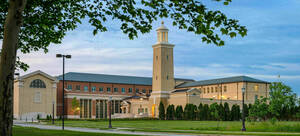Initiative for Adaptive Buildings and Cities: Prioritizing Regional Design
Pope Francis’ 2015 encyclical, Laudato si’, is a direct call to address the socioeconomic, urban, and environmental woes of our common home. It is a radical and urgent message to generate profound changes in both urban and rural lifestyles and modes of production and consumption. It calls for environmental stewardship through peaceful means. It demands an unprecedented discussion of avenues through which we may save our planet and ways in which we can ensure an acceptable quality of life for all, not just the rich and powerful nations that dominate global political and economic affairs.

The School of Architecture's Initiative for Adaptive Buildings and Cities is our answer to this call. During the spring 2024 semester, we are presenting five Faculty Roundtable discussions, led by Research Associate Carl Elefante.
Although the focus is on engaging School of Architecture faculty, the Roundtable sessions are open to all. Participation by students, faculty from other programs, and other interested parties is not only welcomed but encouraged.
All sessions are recorded and can be viewed here.
- The first session, Interlocking Imperatives, introduces the framework for addressing the challenges of 21st century habitation in the context of the climate, justice, and urban imperatives. (This session was held on January 24.)
- The second session, Reforming Cities and Towns, and the third session, Beyond Modern Buildings, investigate two scales of intervention, urban and building, to overcome the barriers to progress embedded in modern-era biases. (The second session was held on Februrary 14, and the third session is scheduled for March 5.)
- The fourth session, Prioritizing Regional Design, and fifth session, Prioritizing Re-Use, focus on two specific building sector issues critical in addressing the real-world challenges our profession will face during the careers of our students. (The fourth session is scheduled for March 27, and the fifth session is scheduled for April 2.)
Session 4
A misplaced belief in the universality of modern-era principles and practices resulted in the replication of modern-era cities and buildings from the equator to the polar regions and dependence on global supply chains for nearly every building product and material. Both practices produced significant social, economic, and environmental burdens on both sides of the supply-and-demand equation.
A fundamental necessity of indigenous and heritage building traditions, climate-adapted design is a lost art in modern-era architecture. Also, expression derived from the use of regionally-available materials and cultural connections is one of the most defining characteristics in the rich history of architecture. Rediscovering regionally appropriate cultural and climatic design and materiality is essential in defining post-modern built and urban form.
Pre-Recorded Guest Presentations
- Global South Perspective – Ceylan Irem Gencer, Associate Professor, Yildiz Technical University – Lessons from the Global South: architecture without architects.
- Bioclimatic Design – Victor Olgyay, Principal, Rocky Mountain Institute – Built form as climate response: the work of Victor and Aladar Olgyay.
Sponsored by the School of Architecture